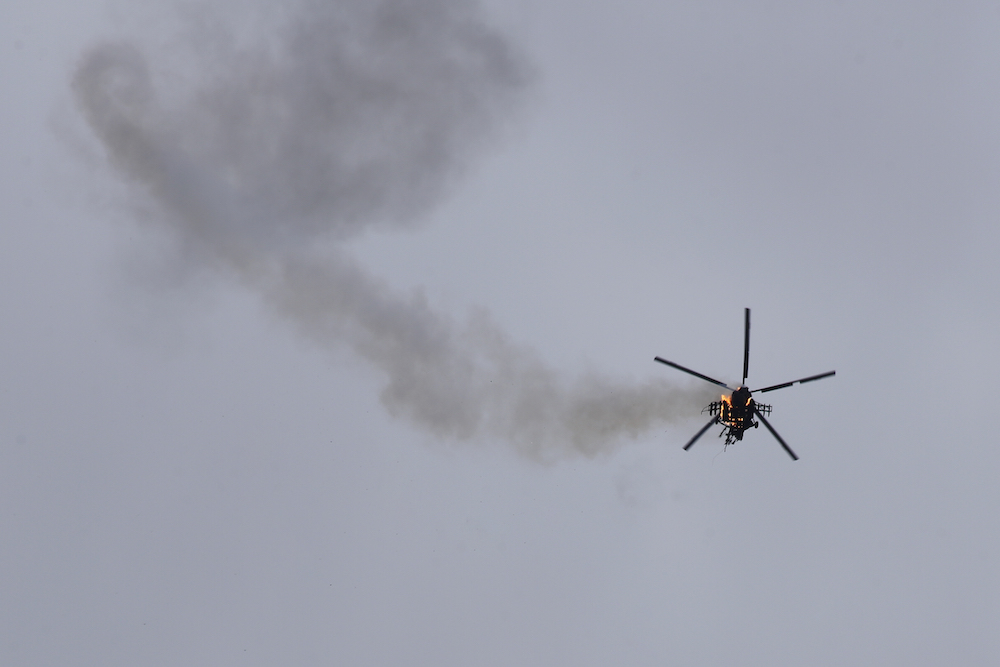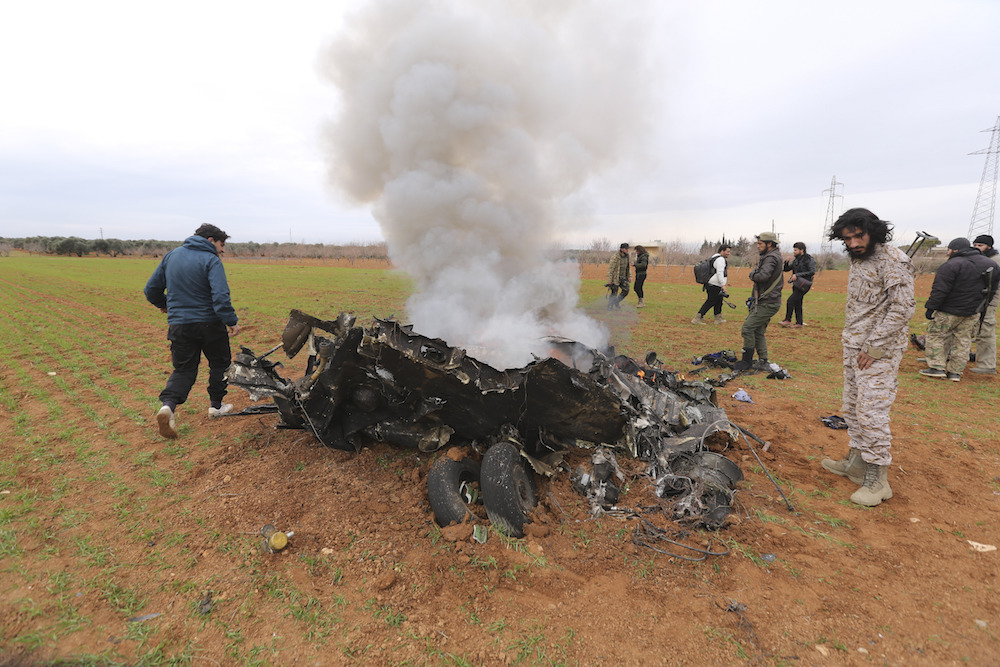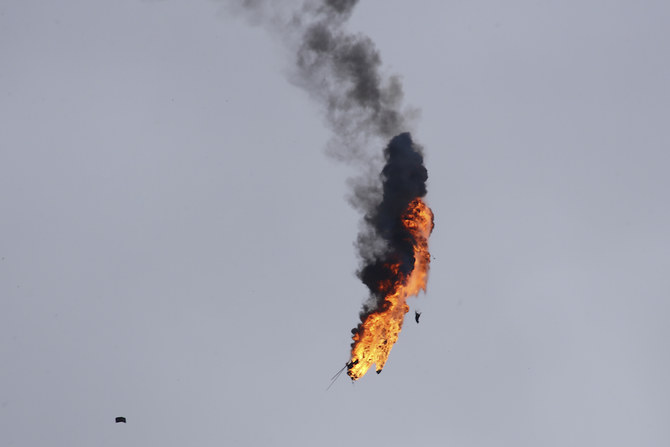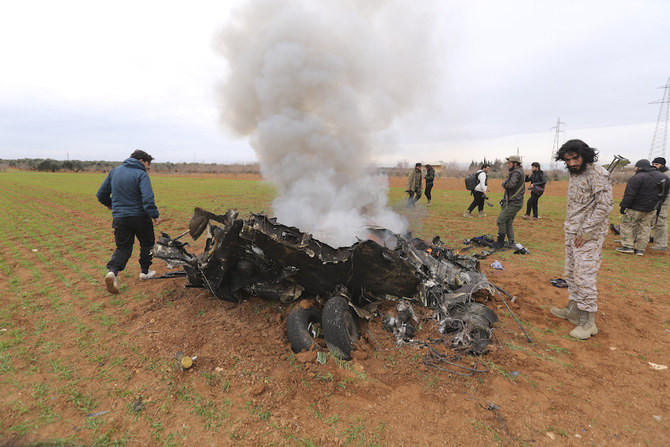AMMAN/ANKARA: Turkish-backed Syrian rebels on Tuesday struck back against Russian-supported government forces who had made gains in their campaign to eradicate the last rebel strongholds in northwest Syria.
Earlier on Tuesday, the government forces seized control of the main Aleppo-to-Damascus highway running through Idlib province for the first time since 2012, a war monitor said.
In response, the rebels shot down a Syrian military helicopter and advanced toward the town of Nairab, which the Turkish defense ministry said had been been abandoned by Syrian government forces.
A Turkish official said the rebels, supported by Turkish artillery, had begun “a full-fledged attack” on an area recently lost near Saraqeb, a strategic crossroads town on the M5 highway. A rebel commander told Reuters they were pushing back the government forces there.
The flare-up of violence has prompted some of the most serious confrontations between Ankara and Damascus in the nine-year-old war in which Moscow and Tehran back Syrian President Bashar Assad.
Idlib’s fate may well be decided by Turkey and Russia as much as by Assad.

Russian has officers on the ground advising the Syrians on the campaign and some ground forces, and Russian warplanes have carried out numerous air strikes.
Ankara has sent thousands of soldiers across the border to stem the Syrian offensive.
Relief agencies meanwhile said an exodus of hundreds of thousands of civilians from the afflicted areas was the largest such movement in the war and marked a new humanitarian crisis.
Turkey, which already hosts 3.6 million Syrian refugees, says it cannot absorb any more. It said it will halt new refugee waves from Idlib and its military will remain there.
Turkish President Tayyip Erdogan said on Tuesday the Syrian government would pay a “very heavy price” for attacking Turkish troops, including five killed on Monday and eight Turkish personnel killed a week earlier.

“We gave the necessary responses to the Syrian side at the highest level. Especially in Idlib, they got what they deserved. But this is not enough, it will continue,” he said in Ankara, adding he would announce on Wednesday a detailed plan for Idlib.
Talks in Ankara between Turkey and a Russian delegation ended on Monday without agreement on halting the clashes, a Turkish diplomatic source said.
Ankara told the Russians that attacks against Turkish posts must cease immediately and said it destroyed several Syrian government targets in retaliation. Erdogan has warned Turkey would drive back Assad’s forces unless they withdraw by the end of the month.
The Kremlin said on Tuesday all attacks on Russian and Syrian forces in Idlib must stop.
Russian President Vladimir Putin will discuss the situation with Erdogan by phone later on Tuesday, TASS news agency said.
The US envoy for Syria, James Jeffrey, is set to meet senior Turkish officials in Ankara on Wednesday and the US Embassy there said they will discuss working together toward a political solution to the conflict.
Since the new push began in December, government forces have recaptured more than 600 square km of territory and in recent days taken control of dozens of towns and villages.
The rebels are a mix of nationalist factions and jihadists who have had deadly rivalries but are now closing ranks.
Last week government troops recaptured rebel-held Saraqeb, where Turkey had several military personnel stationed.
On Tuesday, the Syrian Observatory for Human Rights said the government forces drove rebels from a foothold near Aleppo to capture the entire length of the M5 highway that connects Aleppo in the north to the capital Damascus then on to southern Daraa.
Aleppo, once Syria’s economic hub, was the scene of heavy fighting between 2012 and 2016 which saw large-scale death and destruction.
Rescue teams said on Tuesday that Russian and Syrian war planes bombed several towns in Idlib, with most air raids in western Aleppo. At least 13 civilians were killed overnight in the air strikes, they said.
The rapid advances by Assad’s forces in Idlib have driven nearly 700,000 people — most of them women and children — from their homes toward the closed-off Turkish border in the past 10 weeks.
“This is, from our initial analysis, the largest number of people in a single period since the Syrian crisis began almost nine years ago,” Jens Laerke, spokesman for the United Nations’ OCHA humanitarian agency, told reporters in Geneva.
United Nations High Commissioner for Refugees spokesman Andrej Mahecic said the harsh winter weather was making their suffering worse and shelter was hard to find.
“Even finding a place in an unfinished building is becoming nearly impossible,” he said, adding that mosques were full.
Witnesses and rebels said a new column of Turkish reinforcements, including tanks, rocket launchers and armored vehicles, crossed the border into Idlib overnight.
One influential Turkish politician urged Erdogan to go further.
“There will be no peace in Turkey until Assad is brought down from his throne. Turkey must start plans to enter Damascus now, and annihilate the cruel ones,” said Devlet Bahceli, chairman of Erdogan’s nationalist partner party.
The battle for Idlib is a crucial stage of a war that has killed hundreds of thousands of combatants and civilians, made millions refugees in their own country or overseas, and fractured the wider Middle East since it broke out amid the Arab Spring in 2011.
Moscow’s military intervention in 2015 helped swing the war decisively in favor of Assad, Syria’s ruler for nearly 20 years, but he now presides over a devastated country.





























